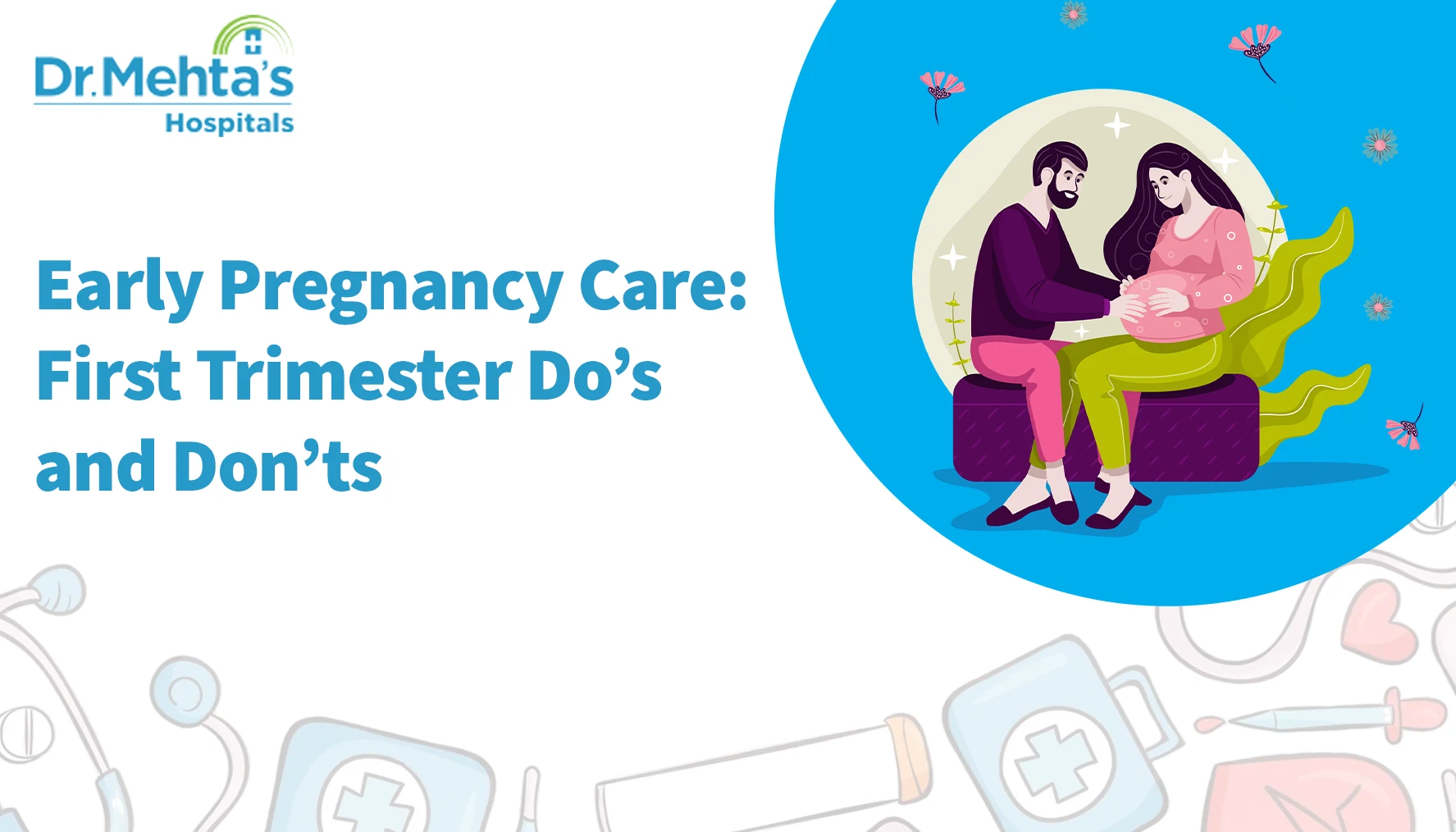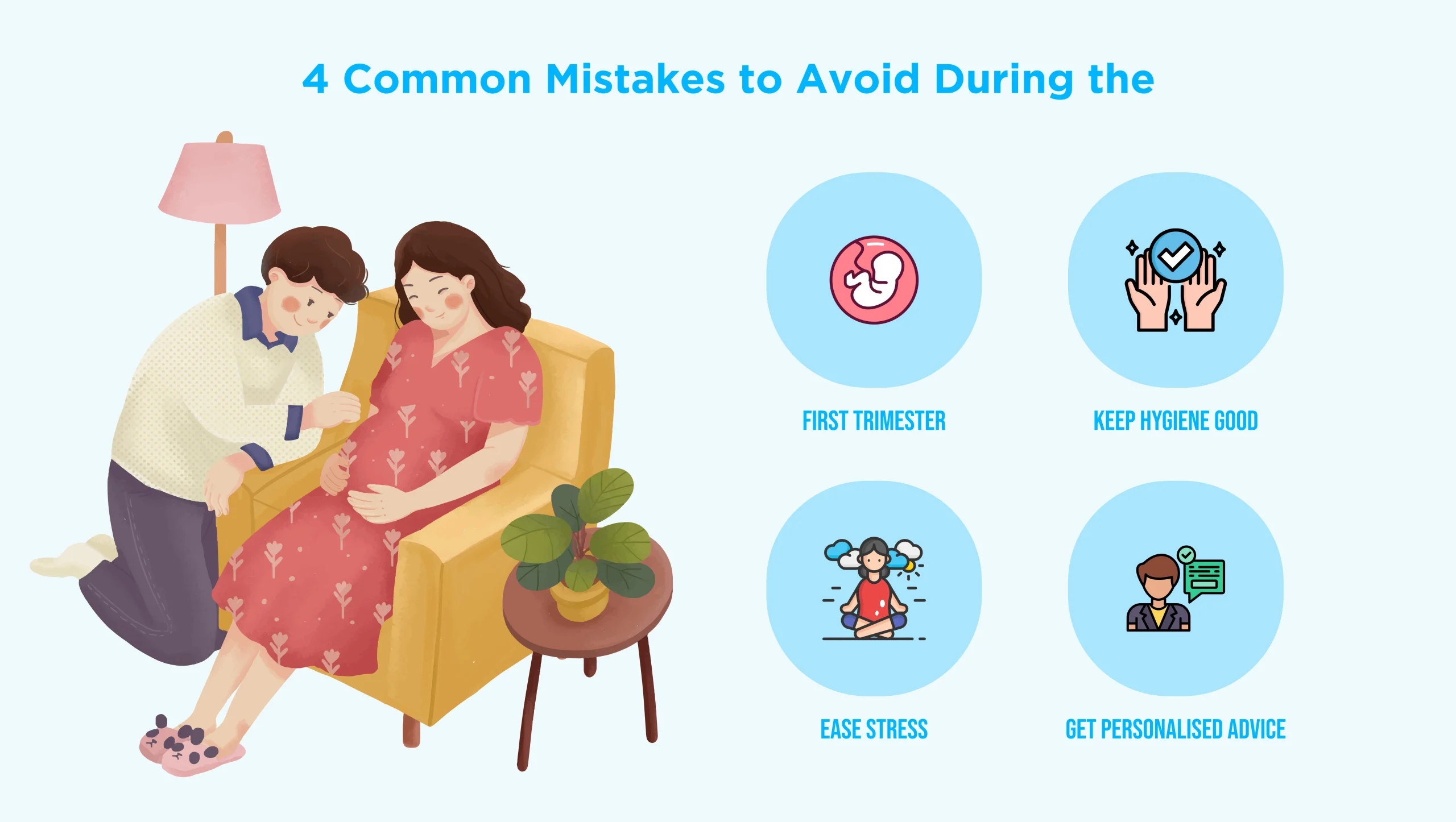Table of Contents

The first trimester, your first three months, is one of the most sensitive and exciting phases of pregnancy. Your body begins adjusting to hormonal shifts while your baby’s major organs start developing. Knowing the right do’s and don’ts early on can make a meaningful difference to your health and your baby’s development.
The first trimester (weeks 1-10) brings major physical and hormonal changes. You may experience morning sickness, fatigue, and mood swings as your baby’s brain, spine, and heart start forming.
Between 2019 and 2021, around 70% of mothers had their first antenatal check-up in the first trimester, a rise from 58.6% in 2015–2016.
This is also when early prenatal care becomes crucial. Regular check-ups, a nutritious diet, and emotional support help reduce complications and make your journey smoother.
Common first trimester pregnancy symptoms are:
If you experience severe pain or heavy bleeding, contact your doctor right away.
The first trimester lays the foundation for your baby’s overall growth and development. It is the stage during which such vital organs as the brain, spine, and organs start developing, i.e., the right nutrition and habits become the most important.
Healthy precautions during this stage help reduce the risk of nutrient deficiencies, infections, and early complications. Regular visits with your obstetric care specialists in Chennai help monitor your progress, manage symptoms, and provide personalised first-trimester guidance.
About 60% of women had their first pregnancy check-up during the first trimester, but only 21% received complete antenatal care, meaning they accessed all the recommended health services.
Your daily habits can play a big role in keeping both you and your baby healthy. Here’s a simple guide to what you should do and avoid during your first trimester.
| Do’s (Safe & Recommended) | Don’ts (Avoid or Limit) |
| Take prenatal vitamins daily – especially folic acid and iron to support brain and spinal development. | Don’t skip prenatal supplements – deficiencies increase the risk of anemia and birth defects. |
| Eat balanced meals – include fruits, vegetables, grains, lean proteins, and dairy for complete nutrition. | Avoid raw, undercooked, or unpasteurized foods – these may cause infections like Listeria or toxoplasmosis. |
| Stay hydrated – drink 8–10 glasses of water daily to prevent dehydration and constipation. | Don’t drink alcohol or smoke – both can affect your baby’s growth and lead to developmental issues. |
| Get enough rest – at least 8 hours of sleep supports hormonal balance and energy levels. | Avoid excessive caffeine – limit tea or coffee to one cup a day. |
| Exercise moderately – light yoga or walking improves circulation and reduces stress. | Don’t overexert yourself – avoid heavy lifting, strenuous workouts, or standing for long hours. |
| Visit your doctor regularly – schedule your first prenatal visit between 6–8 weeks. | Don’t miss check-ups – early scans and tests help detect issues early. |
Every pregnancy is unique. Follow your doctor’s guidance before making lifestyle or diet changes.
It’s normal to feel overwhelmed, especially in your first pregnancy. Here are some habits to avoid for a safer first trimester:
A large number of these errors can be prevented through appropriate prenatal care. Frequent visits to our top gynecologists in Velappanchavadi, Chennai, will have each procedure of your first trimester supervised.

Pregnancy is a journey that is touching and also transformative. Here are a few pregnancy first trimester tips given by the top obstetricians in Chennai to help you be confident and calm:
Expert gynecologists in Chetpet provide the first three months of pregnancy care to the expecting mothers in the city of Chennai.
The first trimester is all about establishing a healthy ground, physically, mentally, and emotionally. With proper pregnancy care guidelines, good communication with your physician, as well as a bit of relaxation, you can look forward to a happier, healthier pregnancy experience.
When pregnant or planning to have a baby, refer to a reputable gynecologist in Chennai within Dr. Mehta’s Hospitals to receive specialized help in your prenatal experience. Contact our experts right now and start your treatment procedure immediately.
Table of Contents
Recent Post
About us
Dr. Mehta’s Hospitals is a leading multispecialty hospital in Chennai with over 90 years of excellence. With 400+ beds and 80+ specialties, its Chetpet and Velappanchavadi centers offer advanced, state-of-the-art, compassionate care under one roof.
Chetpet Contact Details
Velappanchavadi Contact Details
Feel free to ask your queries on
Our Specialities
About us
Dr. Mehta’s Hospitals is a leading multispecialty hospital in Chennai with over 90 years of excellence. With 400+ beds and 80+ specialties, its Chetpet and Velappanchavadi centers offer advanced, state-of-the-art, compassionate care under one roof.
Chetpet Contact Details
Velappanchavadi Contact Details
Feel free to ask your queries on
Our Specialities
Quick Links
Center Of Excellence